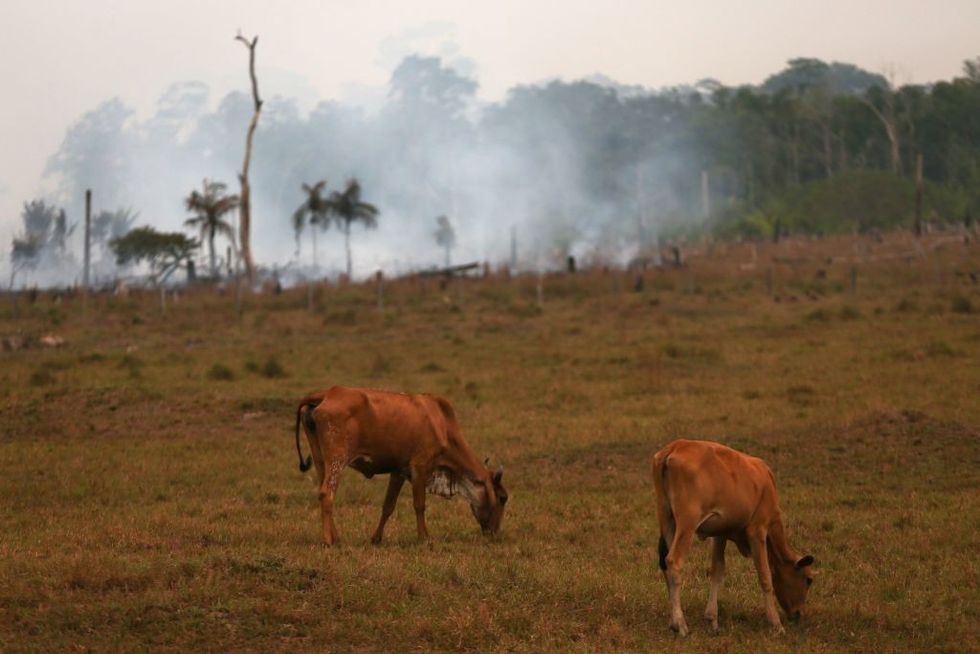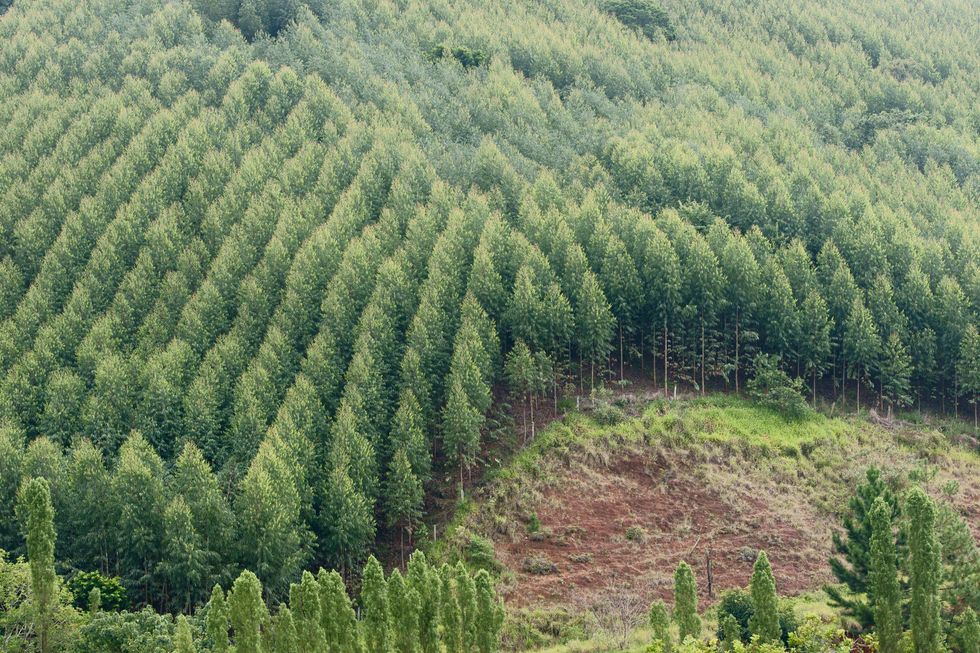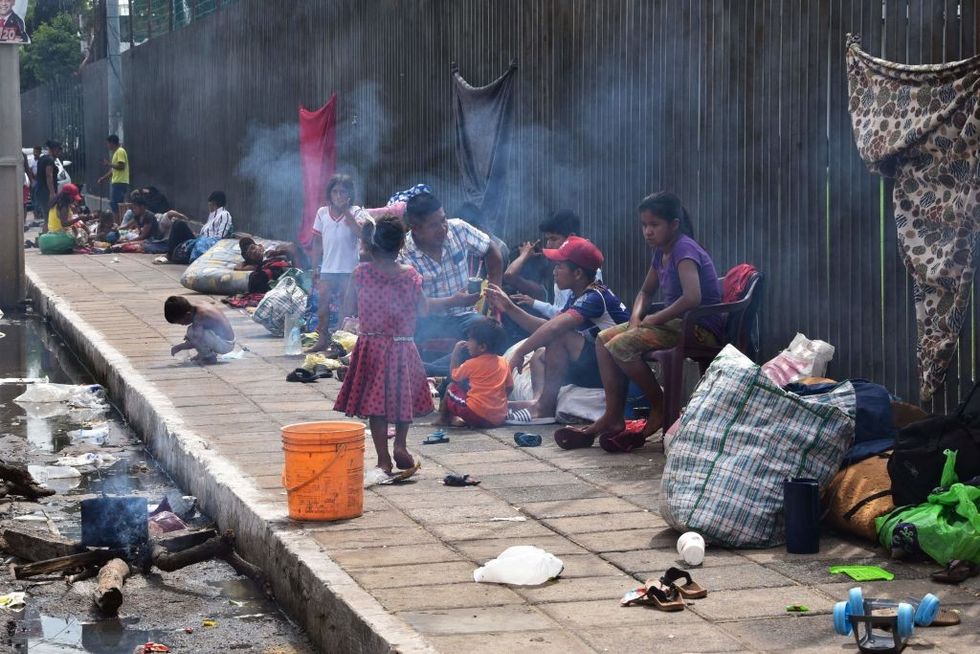

SUBSCRIBE TO OUR FREE NEWSLETTER
Daily news & progressive opinion—funded by the people, not the corporations—delivered straight to your inbox.
5
#000000
#FFFFFF
To donate by check, phone, or other method, see our More Ways to Give page.


Daily news & progressive opinion—funded by the people, not the corporations—delivered straight to your inbox.
Climate finance must be redirected away from greenwashing and towards real solutions like a just transition, helping frontline communities, conservation, protection of land and forests, and reforestation.
On July 12, 2023, the United Nations Framework Convention on Climate Change’s Green Climate Fund, the largest global fund dedicated to combating climate change, approved a funding proposal by the &Green Fund for more than $189.3 million for monoculture plantations of oil palm, cocoa, and rubber, and for unsustainable industrial cattle farming. It was passed during the fund’s 36th Board Meeting, held in the Republic of Korea.
Civil society organizations had earlier raised concerns that the Green Climate Fund (GCF) was considering more investments in false climate change solutions such as monoculture plantations and intensive livestock farming, which exacerbate the impacts of climate change. The GCF Observer Network had put forward their concerns prior to and during the board meeting outlining why &Green Fund’s proposal should not be approved. Despite strong opposition that the project—which has the Dutch Development Bank (FMO) as the accredited entity—would further undermine the rights of Indigenous Peoples and enable greenwashing, the proposal was passed.
The &Green portfolio includes agribusiness such as the multinational food processing company Marfrig from Brazil, which has been accused of repeatedly being involved in illegal tree cutting, “cattle laundering,” and extensive palm oil monoculture tree plantations in Indonesia.
The GCF, established in 2010, is mandated by the U.N. Framework Convention on Climate Change and the Paris agreement to support countries of the Global South in countering the impacts of climate change. However, the GCF has historically approved and funded other highly-controversial projects, such as a $25 million equity agreement with the Arbaro Fund, a Germany-based private equity investment firm, for monoculture tree plantations that have led to devastating social, environmental, and economic harm particularly in the Global South, to Indigenous peoples, local communities, and women in all their diversities.

Cattle graze amongst the hazy smoke caused by fires along the BR-230 (Transamazonica) highway in Manicoré, in Amazonas, Brazil on September 22, 2022.
(Photo: Michael Dantas /AFP via Getty Images)
The &Green Fund has been fully operational since 2017 and currently has a portfolio of seven ongoing projects, mainly consisting of intensive cattle farming and monocultures. The funding proposal submitted to the GCF basically consisted of a request for public finance to de-risk private sector investments in “deforestation-free and socially inclusive commodity supply chains”—in other words, for monoculture plantations of oil palm, cocoa, and rubber, and unsustainable industrial cattle farming. The &Green portfolio includes agribusiness such as the multinational food processing company Marfrig from Brazil, which has been accused of repeatedly being involved in illegal tree cutting, “cattle laundering,” and extensive palm oil monoculture tree plantations in Indonesia.
The funding proposal had many other concerning aspects such as a very complex financing structure, overly optimistic claims of CO2 reduction, and the fact that their projects could include GMO seeds. It demands public climate finance to support agribusinesses that already have access to large amounts of finance. If this funding proposal is approved, we will very likely see some of the same impacts and mistakes that are being reported in the sub-projects part of the Arbaro Fund.

A eucalyptus plantation is seen in Sao Luis do Paraitinga, Brazil on January 1, 2015.
(Photo: Laurent Guerinaud/AGB Photo Library/Universal Images Group via Getty Images)
The Arbaro Fund proposal approved by the GCF in 2020 led to the establishment of 75,000 hectares of new tree plantations across seven target countries in Latin America and sub-Saharan Africa. Since its creation, the Arbaro Fund has been critiqued by more than 100 civil society organizations due to the negative social, environmental, and economic impacts of extensive monoculture tree plantations for industrial purposes. These include the displacement of local communities from their traditional land and livelihoods, increasing insecurity in land tenure, a disruption in the local peasant economy, the worsening of economic difficulties, rising divisions within the communities, and the further erosion of the rights and agency of women in all their diversities.
These impacts have been documented in studies and reports by the World Rainforest Movement, the Global Forest Coalition, and Centro de Estudios Heñói. More recently, an investigation led by Lighthouse Reports showed how European development finance institutions, including the FMO, where the Dutch state is the bank's largest shareholder, fund forestry businesses that use agrochemicals that are banned by the European Union itself.
As the studies show, the territorialization of agribusiness and, in recent years, of eucalyptus plantations, has led to the large-scale displacement of communitie
False promises of development and mitigation of climate change and the expansion of industrial monoculture tree plantations have been a common pattern in the countries where Arbaro operates. The Centro de Estudios Heñói has highlighted the tendency of the forestry industry to reproduce the predominant agro-export model in Paraguay. Quite contrary to the declarations of good intentions and the greenwashed claims of carbon capture and greenhouse gas reduction, these eucalyptus trees end up as charcoal to dry soybeans, corn, wheat, and others.
As the studies show, the territorialization of agribusiness and, in recent years, of eucalyptus plantations, has led to the large-scale displacement of communities. The inhabitants also experience biodiversity loss, as animals, food crops, water, and soil are affected. There are cases of overt and potential land conflicts with the companies (in Santaní, area of influence of Forestal Apepú, a timber production business fully owned by Arbaro) and other historical cases such as the case of Barbero Kue (area of influence of Forestal San Pedro). Contrary to the companies’ claims about their social commitment to the communities, the inhabitants report that they do not receive any type of assistance. Most jobs are temporary and dangerous and disassociate the workers from their peasant culture.

Indigenous people camp outside the National Institute of the Indigenous headquarters during a protest asking assistance for agricultural production, land purchase and better health service in Asunción, Paraguay, on January 23, 2023.
(Photo: Norberto Duarte/AFP via Getty Images)
In June 2023, Heñói Centro de Estudios conducted field visits to communities near Apepú Forestry. The villagers told Heñói that they were economically impoverished and that the rural youth are being forced to relocate to other regions for work. They also noted that there were threats looming over the Indigenous Peoples and the local communities, owing to the interests of big businesses and large-scale landowners. They stated that they have been dispossessed of their lands, and were going to starve in the cities.
A farmer stated: "The eucalyptus plantations have ruined the water and the soil. Nothing grows here anymore, no beans, cassava, corn, nothing. Before the eucalyptus, our corn was big and beautiful, and we had bountiful harvests. We have lost everything, even after all the sacrifices we have made.”
The weakening food security in the region also impacts the culinary culture of the region. Villagers reported that it is no longer possible to make Vorí vorí, Paraguay soup, or chipa guasú. Food is fundamental to primary socialization, and the communal binding of the peasantry is being lost.
"Though we are the ones who produce food for everyone, farmers are not prioritized by the state or by the companies."
The peasants receive no assistance from the state. "Though we are the ones who produce food for everyone, farmers are not prioritized by the state or by the companies. If food production ends, what will happen to all of us? They do not value us," said another peasant farmer. The local community has been discussing the importance of working together to find a resolution and to demand technical assistance for small producers.
To honor the pledge and recognize the Paris Agreement benchmark of 1.5°C, climate finance must be redirected away from greenwashing and towards real solutions—just transition, climate resilience of frontline communities, conservation, protection of land and forests, and reforestation—and provide direct funding access to Indigenous Peoples, women from frontlines communities, and local communities. Their land rights must be secured, as must their rights to resources, their territories, and their right to govern. Real solutions that are rights-based and gender-just do exist, and they are the only way to prevent catastrophic global climate change.
"Did you sprinkle a little collagen in your smoothie this morning? Might be worth looking into where it came from," said one reporter.
Global demand for collagen—touted as an anti-aging "wonder product"—is driving deforestation and abuses against Indigenous people in Brazil, an investigation published Monday revealed.
The investigation—which involved numerous media outlets and organizations including the Bureau of Investigative Journalism (TBIJ), the Pulitzer Center's Rainforest Investigations Network, the Center for Climate Crime Analysis, ITV, O Joio e O Trigo, and The Guardian—is the first to link bovine collagen with tropical forest loss and violence against Indigenous people, according to its collaborators.
"While collagen's most evangelical users claim the protein can improve hair, skin, nails, and joints, slowing the aging process, it has a dubious effect on the health of the planet," Elisângela Mendonça, Andrew Wasley, and Fábio Zuker wrote in the report.
"Collagen can be extracted from fish, pig and cattle skin, but behind the wildly popular 'bovine' variety in particular lies an opaque industry driving the destruction of tropical forests and fueling violence and human rights abuses in the Brazilian Amazon," the trio added.
\u201cEXCLUSIVE \ud83c\udf0eWe spent months digging into the supply chains for Brazilian bovine collagen \n\nSpoiler alert: they are highly complicated, with numerous middlemen involved, but unlike beef, soy& palm oil, collagen companies have no obligation to track their environmental impacts yet.\u201d— Elis\u00e2ngela Mendon\u00e7a (@Elis\u00e2ngela Mendon\u00e7a) 1678107982
The report's authors linked at least 1,000 square miles of deforestation to the supply chains of two major Brazilian players in the $4 billion annual collagen industry. Some of the collagen is tied to Vital Proteins, a Nestlé-owned U.S. brand whose chief creative officer is the actress Jennifer Aniston.
Collagen is called a "byproduct" of the cattle industry, which is responsible for 80% of deforestation in the Brazilian Amazon. But experts interviewed for the report said that the "byproduct" narrative is largely a myth.
"I wouldn't call any of them byproducts," Rick Jacobsen, commodity policy manager at the U.K.-based Environmental Investigation Agency, told the report's authors. "The margins for the meat industry are quite narrow, so all of the saleable parts of the animal are built into the business model."
\u201cDid you sprinkle a little collagen in your smoothie this morning? Might be worth looking into where it came from. Fantastic/horrifying investigation from @lilimendonca + colleagues #Brazil https://t.co/R9zbcysBnQ\u201d— Stephanie Nolen (@Stephanie Nolen) 1678115903
The publication also cast doubt on claims made by collagen promoters.
The Guardian reports:
While there are studies suggesting taking collagen orally can improve joint and skin health, Harvard School of Public Health cautions potential conflicts of interest exist as most if not all of the research is either funded by the industry or carried out by scientists affiliated with it.
Collagen companies have no obligation to track its environmental impacts. Unlike beef, soya, palm oil, and other food commodities, collagen is also not covered by forthcoming due diligence legislation in the [European Union and United Kingdom] designed to tackle deforestation.
"It's important to ensure that this type of regulation covers all key products that could be linked to deforestation," Jacobsen stressed.
Nestlé responded to the report by stating it has contacted its collagen supplier to look into the investigation's claims, while assuring it is working to "ensure its products are deforestation-free by 2025."
Vital Proteins told its buyers after TBIJ contacted them for comment that it would "end sourcing from the Amazon region effective immediately."
In addition to harming the environment, the collagen industry is fueling human rights crimes, Indigenous leaders and other critics say.
\u201c\ud83d\udea8REVEALED: #Nestl\u00e9 brand sells collagen linked to deforestation and invasion of Indigenous lands in Brazil. \n\n@pulitzercenter RIN Fellow @lilimendonca, @ZukerFabio & @Andrew_Wasley report for @TBIJ. Read here \ud83d\udc49 https://t.co/z0kxMJFnO8 \n\n\u2795 \ud83e\uddf5 1/5\u201d— Rainforest Investigations Network (RIN) (@Rainforest Investigations Network (RIN)) 1678111914
As Mendonça, Wasley, and Zuker noted:
With sales of beef, leather, and collagen booming, more and more forest has been felled and replaced by pastures in recent years, with land often seized illegally. Virtual impunity for land-grabbing during the [former President Jair] Bolsonaro government also fueled attacks on traditional communities. In 2021, the third year of his presidency, there were 305 invasions of Indigenous lands. This is three times more than the 2018 figures reported by the Catholic Church's Indigenous Missionary Council.
"No cattle ranching expansion in the Amazon can take place without violence," Bruno Malheiro, a geographer and professor at the Federal University of Southern and Southeastern Pará, told the authors.
In January—his first month in office—leftist Brazilian President Luiz Inácio Lula da Silva, who has vowed to protect Indigenous peoples and rainforests from deforestation, oversaw a 61% drop in forest destruction over 2022 levels.
Kátia Silene Akrãtikatêjê, leader of the Akrãtikatêjê Gavião Indigenous people, said her constituents feel "surrounded" and "suffocated" in a "process of territorial confinement" amid creeping deforestation. Last September, a Gavião village was burned to the ground, and residents believe it was no accident.
Land capitalists "destroy what is theirs, and invade what is ours," the Akrãtikatêjê Gavião chief said. "I can't understand why they destroy everything."